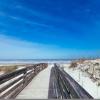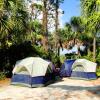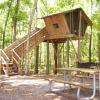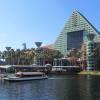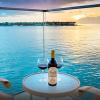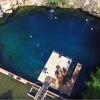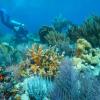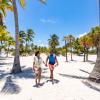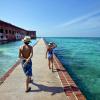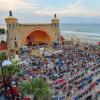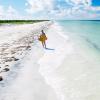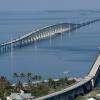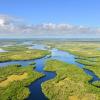By Terry Tomalin
Florida’s largemouth bass put the Sunshine State on the international sportfishing map.
Looking out over the flooded farmland in Fellsmere in southeast Florida that anglers call Stick Marsh, I wondered how we would ever find our way through the hundreds of submerged tree stumps.
"You have to proceed slowly," my guide, Lenny Crispino, explains. "But trust me, it will be worth it."
Lenny Crispino lives near Tampa, but doesn't mind getting up in the dark and driving across the state to fish this 16,500-acre man-made impoundment. Though the nearest big city is Vero Beach, most Florida fishing guides are familiar with its waters. "When it comes to big bass, this is as good as it gets," says Crispino. "It is not uncommon to catch 50 fish in a day here. And there are plenty over 10 pounds."
Florida has more than 7,700 named lakes greater than 10 acres, but only a select few make the Florida Fish and Wildlife Conservation Commission's (FWC) Top Ten Bass Lakes list. Stick Marsh previously earned that honor year after year, but other lakes are finding their place on the big, pass map.
WHY THEY COME
Florida has an estimated 2 million resident anglers, and another million visitors fish state waters every year. With more than 700 world records to its credit - more than any other state or country - Florida can honestly claim the title of "Fishing Capital of the World." But while saltwater fishing has played an important role in the state's economy, it is Florida's largemouth bass and its varieties like the butterfly peacock bass that put the Sunshine State on the international sportfishing map.
Anglers know the odds of catching trophy fish - 10 pounds or larger - are as good as it gets in Florida. The term "trophy," however, is a misnomer when it comes to Florida bass, because the vast majority of anglers would rather take a picture than take a fish. Crispino, who makes his living on the water, is no exception. Many lakes are strictly catch and release, which is another reason why the fishing is so good.
Florida Lakes in the 2012 List of Top Spots for Black Bass
15 bodies of freshwater made the 2012 list of Top Spots for Black Bass: Lake George, West Lake Tohopekaliga (Lake Toho), Lake Kissimmee, Rodman Reservoir, Lake Tarpon, Evers Reservoir, Lake Istokpoga, Winter Haven South Chain of Lakes, Lake Talquin, Suwannee River, Lake Okeechobee, Everglades Water Conservation Areas 2 and 3, Lake Monroe, Tenoroc Fish Management Area Lakes and Mosaic Fish Management Area.
Listed above in no particular order, each destination has its own appeal to anglers, varied topography, impressive nature and, of course, productive bass fishing. For details about each location, click here.
LARGEMOUTH BASS
Depending on whom you ask, Florida largemouth bass could be a distinct species, different from its northern cousin, or merely a subspecies. But the debate is academic. No one disputes the fact that the Florida "bucketmouth" grow bigger and fatter than any other species of bass.
"You can credit that to our year-round growing season," says Wes Porak, a biologist with the Florida Fish and Wildlife Conservation Commission. "We have warm water and plenty of vegetation. Put those together and you have big bass."
Black bass, Micropterus salmoides floridanus, were once found only on the Florida peninsula but have since been introduced in Texas and California.
A fish 10 pounds or larger is considered a "trophy." Females live longer than males and are more likely to reach "trophy" size. Most conservation-minded anglers release large fish because of their future spawning potential.
The largest (certified) largemouth bass in Florida was caught in 1986 in Polk County (in Central Florida) and weighed 17 pounds, 4 ounces.
TIPS AND TACKLE
The Florida largemouth bass has a reputation as a "tackle buster." Florida's fabled "bucketmouth" will attack just about anything- minnows, frogs, even baby ducks.
If you are planning a trip, spring is the best time to hunt a trophy bass. The season starts earlier in South Florida. February through April are peak months in Central Florida. As summer approaches, the fishing improves in North Florida.
While professional bass anglers use artificial lures on the tournament trail, the bait of choice for most anglers is either the golden shiner or the wild shiner, a thick-bodied baitfish found in most Florida lakes. When it comes to artificial lures, the plastic worm is probably the most widely used bait. The color is a matter of choice, but a general rule is the darker the better. Crank baits and spinner baits are other popular choices, but when it comes to heart-pounding action, nothing beats the sight of a big bass banging a topwater plug.
FISHING TOURNAMENTS
Florida plays host to a variety of fishing tournaments throughout the year. Check out the sampling of events below.
- Ladies Day Tarpon Tournament: Every year on the weekend after Mother’s Day, 200 women and 50 boats take to the Boca Grande Pass that runs south of Gasparilla Island the tarpon fishing capital of the world. Grandmothers, daughters, granddaughters, sisters, aunts and friends compete in what has become an island tradition. This is the unofficial kickoff of the world-famous tarpon season in Boca Grande.
- Light-Tackle Invitational Sailfish Tournament: Stuart is famous for its sailfishing, so it's no surprise this small city on the east coast is the site of one of the biggest (catch-and-release) sailfish tournaments in the U.S. The event is held annually, usually sometime in December.
- Destin Fishing Rodeo: Calling all saltwater cowboys! This month-long October tournament draws upwards of 35,000 anglers to compete in prize categories ranging from Amberjack to Wahoo. Parties and other special events take place throughout the month as well.
- Cobia "BIG" Fish Tournament: The small town of Homosassa (near Crystal River on Florida's gulf coast) offers big prizes the first weekend of June for catches of cobia, grouper and spotted sea trout. Other activities include a Saturday barbecue, Sunday fish fry and live entertainment throughout the weekend.
For a full list of FWC freshwater fish forecasts for 2012, visit myfwc.com/fishing/freshwater/sites-forecast.

